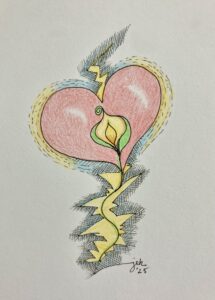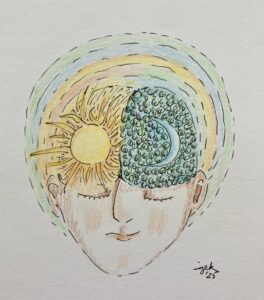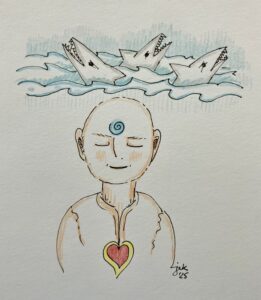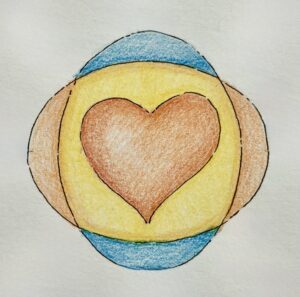
-Artwork © 2025 Jan Ketchel
We are in a time of short-lived truce. Threat of violence has favored conformity over the challenge of liberty. The I Ching, in hexagram 37, depicts our time as one of the Darkening of the Light or Wounding of the Bright. Energetically, the dark forces predominate and movement is ill-advised.
In such times, we are counseled to maintain the brightness of our candle in the hidden sanctuary of our hearts, with the resolute conviction that the sun will indeed rise again, and that sanity and morality will prevail. Though outwardly yielding, inwardly we act through love with wisdom.
More powerful than an armory of weaponry is the substance of our thoughts and feelings. When we consistently state to ourselves an intention, with the gusto of true desire, our subconscious mind will be drawn to this charged suggestion and ultimately bring it to fruition. Our confidence increases as we experience the truth of this divine conscious/subconscious relationship and as we receive the gifts of all that we have requested.
This is not about wishing, pining, envying or empty imagining for that which we desire, but truly living, in the mind, the knowing and tempered excitement that our seed of desire has been planted, and whose growth is well-attended. Love with wisdom grants to all, without discrimination, the full materialization of their own desires, with the stated caveat that it be for the greater good of all.
Love with wisdom also recognizes the need to prune last year’s deadened remains to allow for new growth. If we hoard old habits that no longer serve us, there is insufficient space for new life. Detachment is pruning that frees the energy for latent and desired new growth to come to life.
Love with wisdom knows that good and evil are equal members of all that is. Love with wisdom knows that the interplay of these forces in the times we are in is essential to the higher refinement of love, the greatest opportunity for life in human form. I quote, in depth, from a book entitled Your Forces And How To Use Them, written by Prentice Mulford in 1887:
“Force by the same law may now be acting on you, but force bringing mainly unhappy results; for being so surrounded by evil or immature thought, we unconsciously open our minds to it, and send back more or less of gloomy, despondent, peevish, or other unhealthy thought. It is almost impossible to avoid this, since we live in a cloud of such thought-element, and our minds may be trained by life-long habit to give way to it. We are unconsciously daily co-operating with this order of thought. We now seek to turn this thought into a higher, better channel; and it is turned into such channel when we, if but for a moment, desire the welfare of all people, and exclude not from such blessing the person to us most repulsive, hateful, and disgusting; for every thought of ours, as sent out, is a force in nature; and the more freighted it is with good to all, the greater is that force; and the more of good it sends to others, the more good through its re-actionary effort comes back to us. A thought is not an “idle breath,” here one moment, gone into oblivion the next: and if but once a day we say in all sincerity, “May the Infinite Spirit of Good bless all men and women!” we shall find, when the grand sum-total of all our life is footed up, that the moment so occupied was of all the most profitable; for the force we sent out in thinking this may have been the only one which penetrated the murky thought atmosphere so prevalent all about us, and, reaching upward, brought down to us its corresponding ray of higher, purer, life-giving and constructive force; for every thought of real good brings to us its like in return.”
Love, expressed with the wisdom here so eloquently described, is how we advance ourselves to higher love rather than be consumed by the flames of hatred, revenge and blame. Thoughts of ruin are indeed all about us, but we have the power to exercise love with wisdom as we train our thoughts upon the greater good for all.
May the efforts of all who feel such in their hearts collectively restore the light to our world.
Chuck




